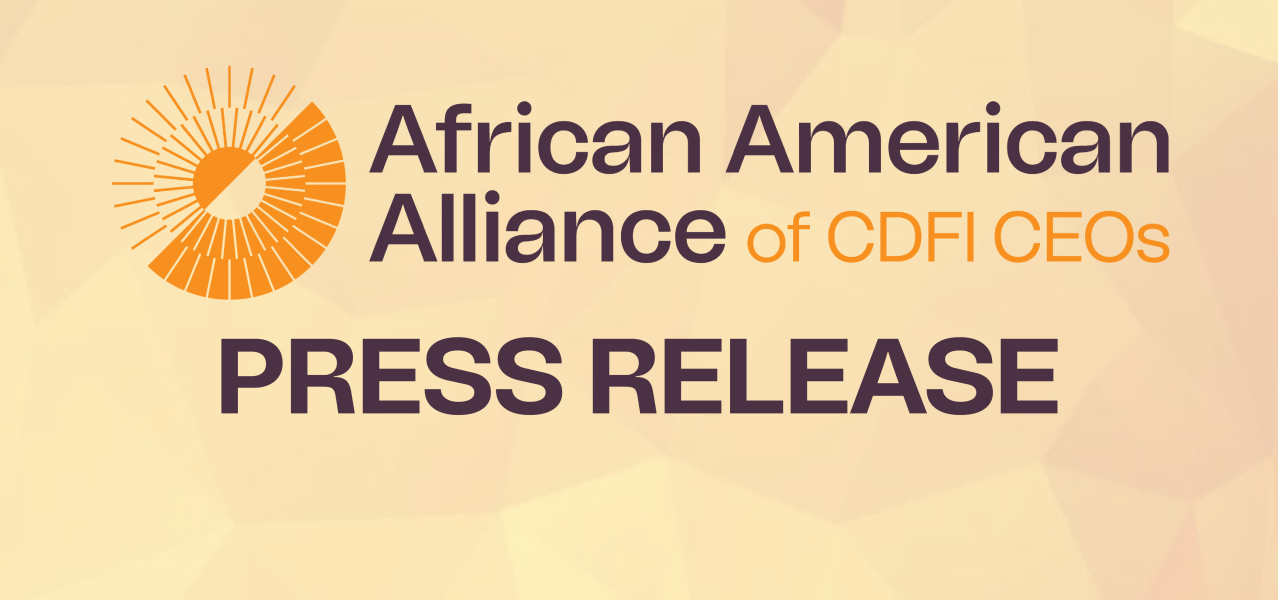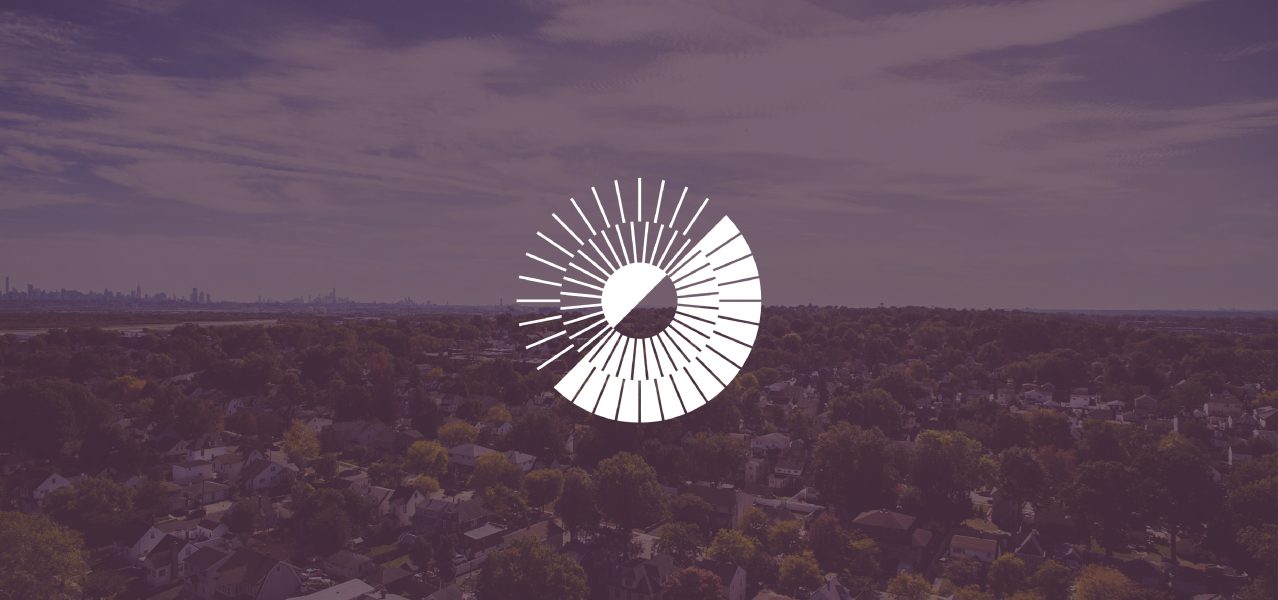In the News: Why Biden’s Hallmark Environmental Program has been Slow to Take Root – Capital B News



First Female President to Lead the Organization
ORLANDO, FL – The African American Alliance of CDFI CEOs (The Alliance) proudly announces the appointment of Amber Bond as its new President. In assuming the role, Bond makes history as the first woman to lead the organization. Lenwood V. Long, Sr., who has been serving as President and CEO, will continue his role as CEO.
With over 17 years of dedicated service in economic development, Bond has proven herself a transformative leader. As Executive VP and COO, she has been instrumental in shaping the strategic vision and managing key initiatives for The Alliance over the past two years. Her expertise and innovative approach have been pivotal in enhancing the organization’s approach to operations, programs, strategic initiatives, and more.
“Amber’s appointment as President marks a transformative chapter for The Alliance,” said Donna Gambrell, Alliance Board Chair and President & CEO of Appalachian Community Capital. “Her visionary outlook for the future of The Alliance brings immense excitement and we can’t wait to see the positive impact she will bring to the organization.”
Lenwood V. Long, Sr., CEO of The Alliance and a renowned figure in the CDFI sector with over 30 years of distinguished service, will maintain his influential position as CEO. He remarked, “Amber Bond’s promotion to President is a testament to her extraordinary leadership and unwavering commitment to economic justice. Her vision and expertise are exactly what The Alliance needs as we prepare for the exciting future in supporting our members.”
Bond’s appointment comes at a pivotal moment for The Alliance as it continues to champion initiatives that empower and build the capacity for Black-led community development financial institutions. In her new role she will provide general oversight to the Alliance and drive its strategic focus. She will also play a critical role within the broader stakeholder base, assisting the CEO with external relations between the board, community, and interagency partnerships.
“I am deeply honored to step into the role of President at such a crucial time for our organization,” said Amber Bond, President of The Alliance. “My journey has been fueled by a passion for bringing equitable resources to black communities that level wealth building opportunities. In my new role, I am committed to expanding The Alliance’s impact, ensuring we continue to break new ground in service of our mission.”
The Alliance had a remarkable 2023 of building partnerships and programs to serve Black-led CDFIs. Through collective efforts, The Alliance will continue to create pathways to prosperity for those who have been marginalized for far too long.
To learn more about what’s next for The Alliance, please visit http://www.aaacdfi.org.
# # #
African American Alliance of CDFI CEOs
The African American Alliance of CDFI CEOs, known as “The Alliance,” is a membership organization consisting of 76 CEOs from Black-led Community Development Financial Institutions (CDFIs). These institutions include loan funds, credit unions, venture capital firms, and non-profit developers. Since its establishment in 2018, The Alliance’s extensive network has provided services across all 50 states and the District of Columbia. To learn more about The Alliance and its programs, please visit http://www.aaacdfi.org.
Media Contacts:
Alisha Brown / African American Alliance of CDFI CEOs
[email protected] / 901-849-0820

2nd Year of $50,000 Gift to Continue Fostering Organization’s Black Leadership-driven Initiatives
CARMEL, Ind., Nov. 20, 2023 – CNO Financial Group (NYSE: CNO) announced today that for the second consecutive year, the company is donating $50,000 to the African American Alliance of CDFI CEOs (The Alliance). The national membership organization of 76 Black-led community development financial institutions (CDFIs) is committed to fostering social and economic justice for African American communities.
“CNO is pleased to once again provide our donation to The Alliance, which will enable meaningful advancements in support of its membership, including continued training and grant opportunities and increased staff to serve its members’ needs,” said Matt Zimpfer, general counsel and executive sponsor for CNO’s diversity, equity and inclusion program. “Importantly, we believe this donation renewal will further help The Alliance deliver increased access and benefit to its members – all in an effort to reach more unbanked middle-income Americans.”
The Alliance serves Black-led CDFIs nationwide, by supporting and empowering CDFI CEOs to lead and grow their institutional operations, teams, and social impact, while elevating the voices of these Black community leaders. The Alliance also supports African American and female CEO members – who systemically face racial and gender resource inequities that adversely impact their CDFIs and communities. In addition, the organization serves as a thought leader for CDFI public policy issues and engages in research that informs the need to continue its efforts toward helping Black communities achieve economic equity with all people.
“We extend our heartfelt gratitude to the CNO Financial Group for once again choosing to invest in the Alliance’s pivotal mission to close the racial wealth gap,” said Lenwood V. Long, Sr., president & CEO of The Alliance. “Their ongoing commitment and generous funding for the second year running underscores their dedication to addressing racial equity challenges. We are deeply appreciative of CNO for being such powerful advocates and allies in our journey to empower African American communities and advance racial equity.”
Long noted the new donation will help further The Alliance’s CDFI 101 program, which helps emerging CDFIs to properly prepare and apply for CDFI certification – improving access to investment opportunities that can expand their impact on the community.
Last year’s financial donation from CNO was instrumental in enabling The Alliance to continue supporting such vital programs, including the African American Equity Impact Scorecard and the Alliance Women-Led initiative and its grant-making foundation.
CNO’s donation to The Alliance is part of the company’s long-standing commitment to support nonprofit organizations that address the health and financial wellness of middle-income Americans. CNO is also a signatory of the CEO Action for Diversity & Inclusion™ pledge, the Indy Racial Equity Pledge and a supporter of CEO Action for Racial Equity.
To learn more about CNO’s commitment to the community, diversity, equity, and inclusion (DE&I), and corporate social responsibility, visit www.cnoinc.com/corporate-responsibility.
About CNO Financial Group
CNO Financial Group, Inc. (NYSE: CNO) secures the future of middle-income America. CNO provides life and health insurance, annuities, financial services, and workforce benefits solutions through our brands, including Bankers Life, Colonial Penn, Optavise, and Washington National. Our customers work hard to save for the future, and we help protect their health, income, and retirement needs with 3.2 million policies and $33 billion in total assets. Our 3,400 associates, 4,600 exclusive agents and more than 4,000 independent partner agents guide individuals, families, and businesses through a lifetime of financial decisions. For more information, visit www.CNOinc.com.
About The African American Alliance of CDFI CEOs
The African American Alliance of CDFI CEOs (The Alliance) is a membership organization of 76 CEOs of Black-led Community Development Financial Institutions (CDFIs), comprising loan funds, credit unions, venture capital firms, and non-profit developers. Since 2018, The Alliance has represented all 50 states and the District of Columbia. As a result, members are uniquely positioned to address issues related to housing and access to capital for African American populations and communities. Learn more about the Alliance and its programs at http://www.aaacdfi.org.
Media contacts:
CNO Financial Group
Michael McNamara
(860) 549 6442
African American Alliance of CDFI CEOs
Alisha Brown
(901) 849-0820

Today, as we reflect on the newly unveiled Community Reinvestment Act (CRA) regulations, it is essential to recognize the significance of this moment. This landmark legislation, first enacted in 1977, has been a critical tool in the fight against redlining and the promotion of equitable access to banking services for low- and moderate-income communities. The recent revisions, the most significant since 1995, mark a crucial step forward in modernizing the law to reflect the changing landscape of banking in the digital age.
Despite the laudable progress marked by these regulatory changes, there is a lingering sense of what more could have been accomplished in addressing racial equity in banking. Our nation’s struggle with racial disparities in home ownership and wealth accumulation remains a stark reality. While 75 percent of white Americans have a home to call their own, only 46 percent of Black Americans can say the same, and the average white household holds wealth almost eight times that of its Black counterpart.
The decision by regulators – including the Federal Reserve, the Office of the Comptroller of the Currency (OCC), and the Federal Deposit Insurance Corporation (FDIC) – to mandate transparency by compelling large banks to disclose home mortgage loan data, segmented by borrower income, race, and ethnicity, while commendable, merely scratches the surface. By leveraging extensive HMDA data, one would anticipate a more profound commitment to not only transparency but also accountability. Yet, the disclosure, in its current form, lacks the bite to challenge the status quo. It does not encompass a thorough examination of lending practices to address redlining concerns, nor does it hold the banks accountable for potential disparities evident in the data. This could have been a pivotal moment to radically reshape the narrative for Black Americans in their pursuit of homeownership, but it feels as though we’ve stopped short of making that transformative leap toward racial equity.
Further, when it comes to amplifying the voice of those advocating for the disclosure of non-mortgage lending data rooted in race and ethnicity, like the CFPB’s Section 1071 data, the regulators opted for restraint. Their focus remained narrowly tethered to the transparency of a bank’s mortgage lending. The broader spectrum of lending, which has profound implications for Black communities, was left untouched. While the complexities associated with data access are acknowledged, waiting for every star to align before taking action seems a timid approach for agencies tasked with ensuring equity.
Also, the void left by overlooking race-focused lending metrics, geographical and borrower distribution standards, along with widespread support for the inclusion of race and ethnicity into the Retail Lending Test, feels like a missed beat. These elements held the potential to be our frontline tools in confronting and breaking down racial disparities from the ground up, yet this tentative approach does not resonate with the transformative steps we had hoped for.
Finally, it seems as though the regulators are missing a crucial piece of the puzzle by not including data on the racial and ethnic identities of those benefiting from community development activities. The regulators’ caution, prioritizing logistical concerns over potential transformative impacts, is misaligned when our times demand bold action. We might have just lost an opportunity to deeply assess if, and the extent to which, our efforts genuinely uplift those they are meant for and if they are making a real dent in narrowing the racial divide.
Instead, by incorporating explicit racial equity mandates into the CRA final rule, the regulators could have sent a powerful message, directly challenging the age-old lending biases that have persistently held Black Americans from the foundational pillars of wealth creation. True, the terrain is fraught with legal intricacies, but there are some struggles, no matter how intricate, where our commitment must not waver. Pushing for racial fairness and justice in banking is unmistakably one of them. And as the reverberations of these regulatory choices linger, we are left wondering: had we summoned the courage to go further, might we be nearing a moment where Black Americans are on a level playing field in their pursuit of homeownership and wealth?
The era of hesitating in the face of racial disparity is behind us; today, we are summoned to take decisive and fearless action. Let this moment serve as a catalyst for change, inspiring us to redouble our efforts in the pursuit of a more equitable society where the dream of wealth accumulation and financial security is within reach for all, regardless of their race or ethnicity.
“Racial equity in the banking sector is imperative. Beyond just fairness, it’s an urgent call for justice and a critical step toward economic empowerment for all. As we grapple with the intricacies of the revised CRA, the spirit of its original intent cannot wait; we must fervently challenge and expand what we believe is possible. The path to banking equity is immediate, and only with unwavering dedication and collective action will we establish a banking system that genuinely represents everyone.” – Lenwood V. Long, Sr., President & CEO of The Alliance.

The CDFI Fund recently announced that $5 billion has been allocated under the New Markets Tax Credits Program (NMTC Program), a move set to catalyze investment and economic growth in both urban and rural areas. In the 2022 round of the NMTC Program, 102 Community Development Entities (CDEs) emerged as the beneficiaries of these tax credits. These entities were handpicked from a competitive group of 197 applicants that requested an aggregate total of $14.8 billion in tax credit allocation authority. The geographic spread of the award recipients is impressive, spanning 36 states and the District of Columbia. A noteworthy aspect of this allocation is the emphasis on rural upliftment. Over a fifth of the investments are designated for rural locales, translating to an estimated $1 billion in NMTC investments directed towards non-metropolitan counties.
Among the CDEs receiving awards, three Alliance members deserve special mention for their outstanding contributions and commitment to community development: the Black Business Investment Fund, the South Carolina Community Loan Fund, and the Texas Mezzanine Fund. Their recognition is not just a testament to their dedication but also a beacon of hope for other entities striving to make a difference.
With the recent allocation, the cumulative funding via the NMTC Program has surpassed $76 billion. Over time, every dollar from the federal government under this program has traditionally attracted eight times that amount from private sectors. As of the conclusion of the 2022 fiscal year, entities benefiting from NMTC Program awards have channeled in excess of $62.9 billion into ventures within underserved communities and businesses. This funding has directly contributed to the establishment or preservation of over 857,000 employment opportunities and facilitated the development or refurbishment of approximately 239 million square feet in commercial property.

ORLANDO, FL – The African American Alliance of CDFI CEOs (The Alliance) announced today a generous $500,000 grant from Kaiser Permanente. This funding will support general operations and enable The Alliance to provide essential training and technical assistance to Black-led Community Development Financial Institutions (CDFIs) seeking to apply for the Greenhouse Gas Reduction Fund (GGRF).
The Greenhouse Gas Reduction Fund, overseen by the U.S. Environmental Protection Agency (EPA), has the potential to enact substantial environmental improvements by funding greenhouse gas- and air pollution-reducing projects in communities across the U.S., including low income and disadvantaged communities. The program is being implemented through three grant competitions. Yet, many Black-led organizations face barriers navigating the complex application process, thereby limiting their access to these crucial funds and resources.
“When it comes to achieving climate justice, it is imperative that we fight together to protect all communities and neighborhoods threatened by the growing climate crisis,” said Lenwood V. Long, Sr., President and CEO of The Alliance. “With the support from Kaiser Permanente, The Alliance will facilitate green economy lending training and the development of toolkits to support members through every phase of GGRF preparation and application process.”
“Kaiser Permanente is committed to helping diverse entrepreneurs launch and sustain successful small businesses, become agents of change in their own communities, and build wealth for themselves, their employees, and their communities,” said John Vu, vice president of strategy for Community Health at Kaiser Permanente. “This funding has the additional benefit of targeting environmental health, which we know negatively impacts communities of color more severely than others. We are proud to partner with The Alliance to ensure that critical public resources, such as the GGRF, are equitably distributed and reach the communities that need it most.”
By providing training and technical assistance, The Alliance aims to unlock the potential of Black-led organizations to drive environmental solutions and strengthen their communities. Through the GGRF, these organizations can fund projects that reduce greenhouse gas emissions, improve air quality, and create sustainable, green jobs for our economically vulnerable and marginalized communities.
For the latest updates and additional information on The Alliance’s programs and initiatives, please visit www.aaacdfi.org.
###
About The African American Alliance of CDFI CEOs
The African American Alliance of CDFI CEOs (The Alliance) is a membership organization comprising of more than 76 CEOs of Black-led Community Development Financial Institutions (CDFIs), comprising loan funds, credit unions, venture capital firms, and non-profit developers. Since 2018, The Alliance’s network collectively services all 50 states and the District of Columbia. As a result, members are uniquely positioned to address issues related to housing and access to capital for African American populations and communities. Learn more about The Alliance and its programs at http://www.aaacdfi.org.
Media Contacts:
Alisha Brown / African American Alliance of CDFI CEOs
[email protected] / 901-849-0820

Expert in inclusive finance to lead the financial initiative for environmental justice.
Washington, D.C (September 19, 2023)—The Justice Climate Fund (JCF) Board, an assembly of eight distinguished leaders from BIPOC-led
organizations, appointed Mr. Douglass Dubois Sims as the interim Chief Executive Officer (CEO) effective today.
“The JCF was conceived with a clear mission: to provide capital, leverage resources, and champion zero-emission technologies in marginalized areas across the nation. With Mr. Sims onboard, we remain poised to bring transformative solutions to low-income and disadvantaged communities that address complex and multi-dimensional environmental challenges, so a just and sustainable future is possible for all,” Lenwood V. Long Sr., president and CEO of the African American Alliance of CDFI CEOs and JCF board chair, said.
Cathie Mahon, president and CEO of Inclusiv and JCF board treasurer, also commended the unanimous appointment of the JCF interim CEO. “This step in JCF’s development is an exciting milestone in our collective effort to ensure community-owned and -led financial institutions drive change in our
communities by increasing access to affordable clean and efficient energy, reducing pollutants, and creating lasting solutions for our planet.”
Formed by the Community Color of Builders Coalition, JCF is an eligible direct recipient of the Environmental Protection Agency’s (EPA) $27 billion Greenhouse Gas Reduction Fund (GGRF). It will channel capital and resources towards community-focused lenders, which include Community Development Financial Institution and Minority Depository Institution credit unions, banks, and loan funds. This ensures underserved communities, especially those of color, can create good-paying jobs, lower energy costs, and safeguard the health of their families, while reducing pollution.
“It is a privilege to be a part of this historic work,” Mr. Sims said. “With guidance from the JCF Board and the support of our growing network of members and partners, the JCF team will bring to the forefront the voices of those who are most impacted by the climate crisis.”
He added that accessibility, transparency, inclusivity, and sustainability will drive the financial initiative’s efforts. “We will continue to engage and convene with all our stakeholders to empower the communities we serve. In bringing in everyone to decide on the positive course of our environmental future, our well-being and those of following generations are assured,” Mr. Sims said.
In the last two decades, Mr. Sims has been creating and implementing regulatory and market-based frameworks to increase investments in renewable energy and climate-resilient infrastructure. He has also spearheaded international and national strategies that facilitated both change and support for the reduction of greenhouse gas emissions.
Mr. Sims, who has held high-level roles in various nonprofit organizations, will also assist the JCF Board in searching for a permanent JFC CEO.
To date, JCF is in the process of submitting applications for the Clean Communities Investment Accelerator, a $6 billion program that will focus exclusively on low-income and disadvantaged communities, and the National Clean Investment Fund. The latter requires that at least 40 percent of the grant’s $14 billion budget will be dedicated to communities that have been historically left behind.
JCF, whose BIPOC-led members and partners have been working for many decades to bring equity and justice in underserved communities, has a collective financial strength of $461 billion in assets and vast grassroots presence across all of EPA’s 10 regions. Its expertise in green lending also positions the financial initiative as one of the most capable conduits to deploy intentional and coordinated investments that will strengthen the nation’s climate resilience.
###
About JCF
The Justice Climate Fund provides capital, leverages resources, and supports zero-emission technologies in underserved communities across the country. It is founded by the Community Color of Builders Coalition, a growing national network of BIPOC-led financial institutions and advocacy organizations. They have come together to ensure that all communities equitably benefit from the GGRF. See www.justiceclimatefund.org.
Press Contact
[email protected]
(202) 987-3770

A Unique Partnership that Creates Lasting Legacies of Advancement Within Black-led Organizations and Communities
ORLANDO, FL – The African American Alliance of CDFI CEOs (The Alliance) is proud to announce a transformative partnership with the Black Community Developers Group (BCDG). This groundbreaking collaboration marks a pivotal step towards dismantling institutional racism and closing the racial wealth gap by empowering communities through economic development, education, and leadership.
The news comes on the heels of BCDG’s recent commitment to join the Community Builders of Color Coalition (The Coalition). In addition to their fight for fair equity in the Greenhouse Gas Reduction Fund and strategic reinvestment into disadvantaged and low-income communities, BCDG and The Alliance’s collaboration aims to strengthen both their memberships and the communities they are committed to serving.
The Alliance and BCDG share a common interest in mitigating the hardships endured by minority and low-income populations. Together they will work with local, regional, and national Black organizations to build competencies and drive positive lasting change in housing and community development. The partnership’s areas encompass:
“We are excited to expand our relationship with BCDG. Our shared commitment to addressing the racial wealth gap and empowering Black communities aligns seamlessly. Through harnessing our collective strength, we will drive positive change and move our communities forward,” said Lenwood V. Long, Sr., President and CEO of The Alliance.
“The collaboration between BCDG and the African American Alliance of CDFI CEOs marks establishing a transformative partnership to manifest generational wealth. Our joint efforts can narrow the income disparity, strengthen Black communities, and promote empowerment. Each progressive stride brings us closer to the ideals of justice, equality, and collective prosperity but also emits a ray of optimism for a more equitable future,” said Leatrice Williams Moore, Executive Director, Black Community Developers Group.
The Alliance and BCDG’s partnership is a testament to collective action and shared vision. Through intentional collaboration, these organizations aim to advance Black-led organizations and ensure access to equitable opportunities and sustainable development for the communities they serve.
###
About The African American Alliance of CDFI CEOs
The African American Alliance of CDFI CEOs (The Alliance) is a membership organization comprising of more than 76 CEOs of Black-led Community Development Financial Institutions (CDFIs), comprising loan funds, credit unions, venture capital firms, and non-profit developers. Since 2018, The Alliance’s network collectively services all 50 states and the District of Columbia. As a result, members are uniquely positioned to address issues related to housing and access to capital for African American populations and communities. Learn more about The Alliance and its programs at http://www.aaacdfi.org.
About Black Community Developers Group
Founded in 2020, the Black Community Developers Group (BCDG) was formed as a national coalition of Black-led Community Development Organizations. We exist to address the lack of reparative investments in Black communities, advocate for equity in lending and grant funding, empower black leaders through capacity building and mentorship, and network to strengthen access to resources creating power in numbers. With more than 40 member organizations in rural and urban spaces, BCDG’s mission is rooted in driving transformative change through collaborative efforts, strategic partnerships, and community-driven initiatives.
Media Contacts:
Alisha Brown
African American Alliance of CDFI CEOs
[email protected] / 901-849-0820
Leatrice W. Moore
Black Community Developers Group
[email protected]/ 213-700-1781

New Board Appointments Advance Equitable Climate Initiative for Low-Income Communities
ORLANDO, FL — The Justice Climate Fund, led by the Community Builders of Color Coalition (The Coalition), is pleased to announce the recent appointments to its Board. The addition of these esteemed leaders brings a wealth of experience and leadership that will play a key role in guiding the JCF and its impactful initiatives.
Jeannine Jacokes, CEO of Community Development Bankers Association, and Partners for the Common Good, working to educate stakeholders on community development banks and connecting lenders, borrowers, and capital sources. Pete Upton, CEO and Chairperson for Native CDFI Network, and the Executive Director of Native360 Loan Fund, focusing on entrepreneurship, home ownership, consumer lending and financial literacy for Native Americans. Both are current members of The Coalition and will take on significant roles in directing and guiding the JCF. Each brings a unique set of skills, expertise, commitment, and leadership will be invaluable in propelling the JCF’s goals and endeavors.
The Coalition, united in its focus on ensuring that low-income and disadvantaged communities equitably benefit from the Environmental Protection Agency (EPA)’s Greenhouse Gas Reduction Fund (GGRF), is committed to making positive strides in providing capital and leveraging resources that create sustainable and economic benefits for low-income and disadvantaged communities of color across the nation.
“The appointment of Jeannine and Pete to the JCF Board represents a significant step forward in our relentless pursuit for environmental equity and climate justice. Both have demonstrated a deep commitment and passion that aligns with our mission. Their diverse backgrounds and extensive experience will undoubtedly enrich our efforts in addressing climate justice for all,” said Lenwood V. Long, Sr., President & CEO of The Alliance, and Board Chair of the Justice Climate Fund.
“I am honored to be appointed to the Board of the Justice Climate Fund. I am grateful to Chairman Lenwood Long and entire JFC Board for their leadership in ensuring communities of color and low income and disadvantaged urban, rural, and Native American communities nationwide are empowered to promote climate justice and economic justice. I believe JFC has a winning strategy that ensures GGRF resources are rapidly and responsibly deployed to communities at the grassroots level,” said Jeannine Jacokes, CEO of Community Development Bankers Association.
The Justice Climate Fund, led by The Coalition, is a strategic initiative purposely built to maximize the dual goals of rapid reductions in greenhouse gas emissions and transforming communities through increased benefits (environmental, energy, climate, health and economic). By leveraging the strengths and assets of its members, the Fund aims to achieve real and lasting impacts on the environment and social equity.
“I would like to express my profound gratitude to the Justice Climate Fund and Lenwood Long for their continued support of the Native American communities and native community roots within a trailblazing initiative. The JCF dedication ensures that EPA’s GGRF not only expeditiously tackles the reduction of greenhouse gas emissions but also fosters enduring health and economic improvements for underserved Native American communities across the nation,” said Pete Upton, CEO and Chairperson for Native CDFI Network.
Current members of the JCF Board include Lenwood V. Long, Sr., Board Chair and President & CEO of The Alliance; Marla Bilonick, Board Vice-chair, and President & CEO of NALCAB; Cathie Mahon, Board Treasurer, and President & CEO of Inclusiv; Nicole Elam, Board Secretary, and President & CEO of National Bankers Association; Chrystel Cornelius, Board member, and President & CEO of Oweesta; and Harold Pettigrew, Board member, and President & CEO of Opportunity Finance Network.
To learn more about the Coalition and the Justice Climate Fund, visit: https://aaacdfi.org/greenhouse-gas-reduction-fund/.
# # #
Community Builders of Color Coalition & Justice Climate Fund
Community Builders of Color Coalition, Justice Climate Fund, and African American Alliance of CDFI CEOs are collectively committed to eradicating the disproportionate impact of climate change on low-income and disadvantaged communities through empowering and resourcing BIPOC-led organizations. Learn more about the Coalition and the Justice Climate Fund.
African American Alliance of CDFI CEOs
The African American Alliance of CDFI CEOs, known as “The Alliance,” is a coalition consisting of over 75 CEOs from Black-led Community Development Financial Institutions (CDFIs). These institutions include loan funds, credit unions, venture capital firms, and non-profit developers. Since its establishment in 2018, The Alliance’s extensive network has provided services across all 50 states and the District of Columbia. To learn more about The Alliance and its programs, please visit http://www.aaacdfi.org.
Media Contacts:
Alisha Brown / African American Alliance of CDFI CEOs
[email protected] / 901-849-0820

How one grant has positioned the newly established Justice Climate Fund to competitively apply for the EPA’s #27 billion in clean energy funding